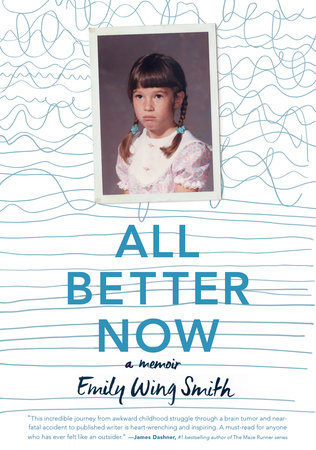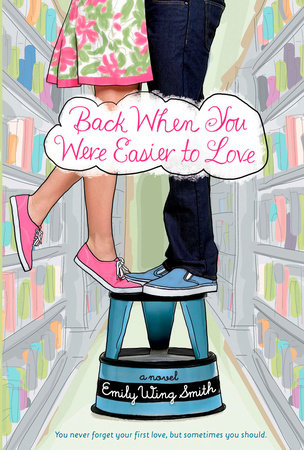
The Way He Lived
“Compassionate and heartfelt.” —Ellen Wittlinger, Michael L. Printz Award Honoree
Winner of the 2009 Utah Book Award
"It’s a testament to Smith’s skills that although her central character speaks only through other people’s recollections, his identity emerges distinctly by the end of the novel."
—Publishers Weekly, starred review
- Pages: 224 Pages
- Publisher: Penguin Young Readers Group
- Imprint: Dutton Books for Young Readers
- ISBN: 9780399187230
An Excerpt From
The Way He Lived
"Thursday’s Child Has Far to Go."
It was the morning of the day I decided to leave.
I wanted to get from the pickup/drop-off zone of the parking lot, where I was currently standing, to the glass doors to Haven High, but the steady stream of cars heading into the A-lot was making it impossible.
I was thinking about my worries, counting them like beads on a rosary. Okay, so I’d never actually seen a rosary before, and I wasn’t sure what you actually did when you counted on one, but I’d heard about it in a song once. I imagined my rosary like one of those slidey-bead toys in doctors’ waiting rooms, where you move the bead from one side of a twisty wire to the other.
Bead one: I was going to be late to class, because I went to school with a bunch of overprivileged white kids rocking out in new Toyotas and clearly not yielding to pedestrians.
But that was just the beginning.
I tried to pull the short sleeves of my pink T-shirt away from my armpits without someone noticing. Already I was sweaty and hot. It was a day in mid-September, a piece of autumn, and it was supposed to get up to ninety degrees. What right had a piece of autumn to get up to ninety degrees?
That’s when I heard a car honk.
It was from a silver Miata, driven by one Natalie Summerson, stopped right in front of me. She waved me across the street with the back of her hand. I did not make eye contact with Natalie. I walked.
I wished I had a silver Miata. Not because I wanted a silver Miata, or even a car, but because I wanted to go away. If I had a silver Miata I would drive. I would drive far, far away from this town. Far away from everybody who knew me or might ever know me if I stayed here. If I had a silver Miata, I would drive and I would not talk to a single living soul. I would talk to Joel and not look over my shoulder to see who was listening. I would not worry about who was thinking what about me talking to a dead guy. I would talk to Joel and he would be dead—he would know it and I would know it—but still it would be like old times, kind of.
I wished I had a silver Miata.
But I didn’t even have a license.
Bead two: I didn’t know how to drive.
Haven High is carpeted, not just the floors but the walls, too, so when I walked in it already felt and smelled like a sweat sock. Because I was running late from the whole getting-into-school debacle, I skipped going to my locker and cut through the cafeteria. My driver’s ed class was on the other side of the building.
I couldn’t get Natalie Summerson and her silver Miata out of my head. It wasn’t her fault that she’d moved to a new “gated hillside community” down the street from her posh old house in Knob Farms, and it wasn’t her fault that my family had bought it. But still.
I hated living in Natalie Summerson’s old room. It felt like wearing somebody else’s underwear.
Natalie Summerson’s old house was bigger than our old one on Maple Street. There were five bathrooms. There were two living rooms, as though we intended to do twice the living we did in our old house. There was a swimming pool in the backyard.
On the rosary of my sucky life, that was bead three: I lived in a house that wasn’t really mine.
By the time I reached the classroom it was almost time for the bell to ring, so I wasn’t the only one at the door. I arrived at the precise moment Tate Williams did.
Tate Williams, Golden Boy of Haven High. Tate Williams, a guy who was no doubt getting a new Prius or Matrix for his sixteenth birthday. Tate Williams, the guy who made most girls want to swoon and me want to spit. I took a step back.
“After you, Claire,” said Tate, smiling at me and gesturing to the door.
I knew Tate Williams’s name, because everybody did. But why did he know mine?
As soon as I walked in the bell blasted, so I scooted into a seat while Mr. Cramblitt, the driver’s ed teacher/basketball coach, was talking. “I need release forms from those of you who’ll be driving today: Claire Espen, Tucker Frye, Mason Grant, and Shelby Holloway. Please bring them to the front with you. The rest of you, study your driving handbook.”
I took the release form out of my folder. I’d had to forge the signature. Mom was always asleep lately, or “out to lunch,” which totally took on a new meaning with her. They shouldn’t let depressed people have kids. When tragedy strikes, people who are tragic to begin with totally can’t handle it. At least Dad had an excuse for checking out: he was always working, probably earning the extra money for the extra living room.
I knew I could say my form wasn’t signed, get out of it completely (this school wouldn’t even let you eat a peanut without your parents’ permission), but that would cause even more problems. All I wanted to do was get this over with.
Joel had been teaching me how to drive. Last February I’d been freaking out about actually turning sixteen in less than a year—in Haven and West Haven alike, it’s a magical birthday. I guess it is most places. But in Haven/West Haven, and anyplace else where the Mormon population sits at around 94 percent, sixteen is something extra. Sixteen is dating age.
I was worried about the dating, but more about the driving.
“Relax,” Joel had said. He was eating Cheetos and there was a thin line of neon-orange powder above his upper lip. I wondered if he had done it on purpose. You could never tell with Joel. “I’ll teach you to drive.”
“You will?” I said. “Isn’t that what driver’s ed is for?”
“You gotta know how to drive before you get into driver’s ed, Claire, or else you’re gonna look stupid.” He crunched down on another Cheeto, and I watched it dissolve in his mouth while he talked.
Disgusting.
“Let’s go. Get your shoes. You always wear shoes when you drive.”
“Now?” I said. I was fifteen and a few months. I didn’t have a permit.
Joel read my mind—he could do that, and not just with me. “Don’t worry about it. We’ll go down to the church parking lot. I’ll get my keys.”
Joel didn’t even have to ask if we could go. He could use the car whenever he wanted without permission. Joel got privileges I didn’t—he could stay out later, and he was best friends with Miles, a guy Mom and Dad didn’t even like me to be around. Total double standard, and it annoyed me big-time. But then he was always using his powers for good, like Superman, so what could I say?
We went into the mudroom just off the kitchen. I put on my hiking boots with the good soles, just in case. We had just gotten a second dose of winter: more snow, more cold. Joel grabbed a BYU sweatshirt and a set of keys off the hook that had his name on a piece of masking tape above it. Mom had labeled one hook for each of us; the masking tape with my name had peeled off when I was little, so that the only part left was a sliver of the “a.”
We drove to the back of the church, next to the Dumpster and the satellite dish, and he moved the shift lever to “P.”
Joel helped me adjust the seat and all the mirrors, told me when I pushed too hard on the brake, and made me stick my left foot behind me so I’d stop using it. He set up imaginary lanes for me (“Pretend you have to drive between that yellow line there and that white one on the side . . . okay, if this was a real road, then you’d be hitting a car . . . again, you’d be hitting a car . . . another car, Claire, straighten your wheel . . .”) and helped me to park and reverse.
“You ready to drive around the whole church?” he asked. His eyes were gleaming. “Ready?”
Heck no, I wanted to say. I’m ready to go home.
I was ready to go home. I didn’t want to practice anymore. But Joel was in his Superman mode. Joel looked like me—a skinny, short kid with pale hair and pale skin—but it was like he saw himself as something else entirely. He was always rescuing people. No matter if they didn’t need rescuing; no matter if he couldn’t save them even if they had. It was how he was.
He got into Superman mode and sometimes it embarrassed me to no end, like when Dakota, the four-year-old next door, lost her cat, KitKat. Joel spearheaded this whole crusade to look for KitKat and put up flyers and everything, but by the time he finished, the cat had come home on her own. Dakota just looked at him with these big, dark eyes, and it was obvious she had forgotten that KitKat had even been missing.
But sometimes I just wanted to let him be Superman. So I said, “Okay, I’m ready to drive around the whole church,” even though I really wasn’t.
Since then, I’d never driven a car without him. But in a matter of minutes that’s what I would be doing.



